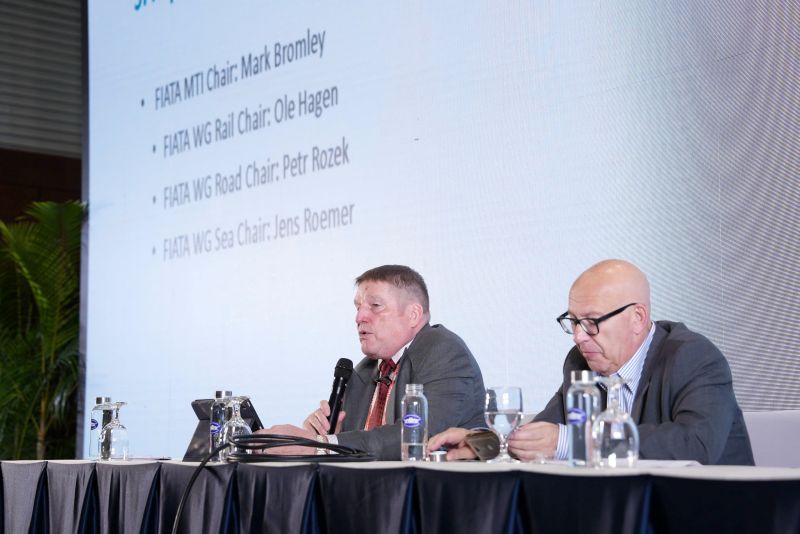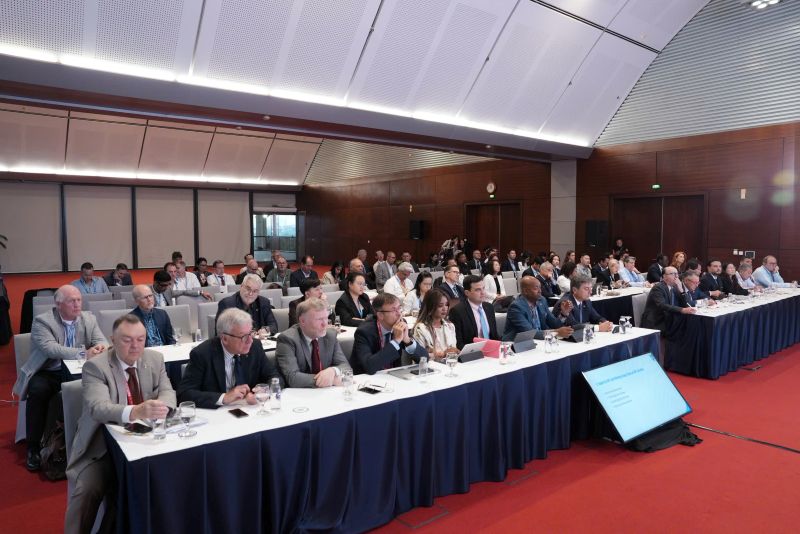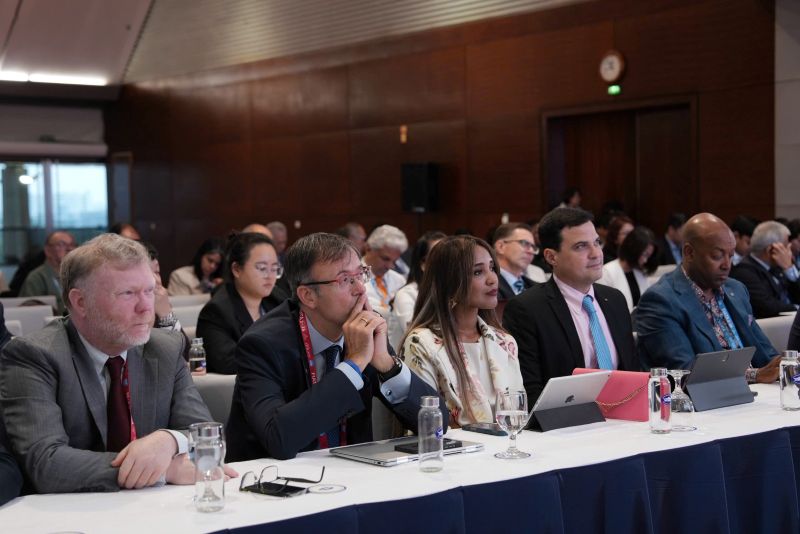FIATA strengthens global standing and warns of supply chain challenges
At the FIATA World Congress 2025 in Hanoi, the Multimodal Transport Institute (MTI) of FIATA unveiled key updates on the state of global logistics and issued a call to action amid growing challenges in the maritime and road transport sectors.

Leaders of FIATA’s Multimodal Transport Institute (MTI) at the FIATA World Congress 2025 in Hanoi, 7 October 2025 (Credit: Trường Đặng)
The International Federation of Freight Forwarders Associations (FIATA) has achieved a major legal and policy breakthrough by being officially granted full consultative status at the International Maritime Organization (IMO).
The MTI meeting on October 7, held within the framework of the FIATA World Congress 2025 in Hanoi, also unveiled a series of new initiatives and concrete actions aimed at protecting the interests of freight forwarders worldwide.
Breakthrough in Global Maritime Governance
According to FIATA’s announcement, the organization has been upgraded from provisional to full consultative status at the IMO, becoming the only entity representing the global freight forwarding and logistics community within the world’s leading maritime regulatory body.
“This is a major success that ensures the voice of freight forwarders will be heard in international rule-making,” said Mark Bromley, Chair of the MTI.
With this status, FIATA now has “a seat at the table,” contributing directly to policy discussions on maritime digitalization — including the implementation of the Maritime Single Window (MSW) — and helping to ensure that the interests of the industry are protected “from being bullied or left behind.”
FIATA has also joined the IMO’s Marine Environment Protection Committee (MEPC) to contribute to the organization’s tightening environmental standards. The IMO’s Net Zero Framework, adopted in April and expected to take effect in 2027, will impose mandatory requirements on large ocean-going vessels.
However, MTI representatives expressed concern that shipping lines could use the new carbon levies as a pretext to add extra surcharges on freight forwarders, calling for greater oversight, transparency and fairness in the green transition process.

FIATA’s recognition as a full consultative organization at the IMO marks a significant milestone for the association and its members (Photo: Truong Dang)
Competition and Supply-Chain Control Challenges
According to the MTI, the global logistics industry remains affected by maritime supply-chain disruptions, with container ports congested and sailing schedules still unreliable.
The greatest risk today comes from vertical integration and the so-called “big transform” — as major shipping lines expand their control into logistics, ports, and warehousing, threatening the independence of freight forwarding companies.
To counter this trend, FIATA has issued a Best Practice Guide on Maritime Contracting, helping members protect their rights against unfair clauses imposed by carriers. The guide emphasizes the role of freight forwarders as contractual carriers when issuing FIATA Bills of Lading (FBLs).
Jens Roemer, Chair of FIATA’s Working Group Sea, stated: “If you’re concerned about vertical integration, act now to protect yourself — issue your own Bill of Lading and control your own supply chain. FIATA will further support you by releasing a handbook on the use of the FIATA eFBL, integrating insurance and becoming a true ‘one-stop shop’ for the industry.”
Regulatory Updates from Europe
FIATA reported that the European Union has implemented the ICS2 Release 3 customs system for maritime transport since April 2025.
Under the new rules, house-level filings are mandatory for all shipments entering or transiting the EU. FIATA successfully secured members’ right to self-file their own data. However, the MTI noted that both EU customs authorities and companies remain underprepared, creating an uncertain environment for procedures and costs.
Another emerging challenge is pest contamination in containers (such as insects and molds). Several countries are pushing for mandatory rules on container cleaning and inspection, which could significantly increase operating costs.
FIATA opposes an overly administrative approach and instead supports a self-regulatory mechanism based on custodial responsibility, under which each stakeholder must ensure that containers received are visibly free from contamination — particularly at empty container depots, often the “hotspots” in the transport chain.
In the road-transport sector, FIATA’s Road Transport Working Group discussed key issues in Europe, including fluctuating freight rates, alternative fuels, driver shortages, and digitalization (e-CMR). One focus was on protecting freight forwarders from unfair liability in contracts brokered through online platforms and preventing the rise of “ghost companies.”
In conclusion, FIATA reaffirmed that trade should be self-regulated rather than controlled by governments through the shared implementation of custodial responsibility across the supply chain.

Advancing the ASEAN Multimodal Transport Framework
Delegates also reviewed progress on the ASEAN Framework for Multimodal Transport Operations, a regional initiative launched in 1998 that is now nearing completion. The framework will enable the issuance of a unified ASEAN Multimodal Transport Document, harmonizing rules among member states and promoting more efficient, transparent cross-border transport.
ASEAN countries requested FIATA’s technical assistance in standardization, procedures, and legal tools for implementation.
An Indian delegate shared that India recently passed a new Bill of Lading Act, allowing the government to supervise carriers’ tariff schedules and enhance transparency across the logistics chain. Other South Asian countries such as Sri Lanka and Bangladesh are following similar paths.
Representing Viet Nam, Nguyen Duy Minh, Vice President of the Viet Nam Logistics Business Association (VLA), emphasized the need to digitize and standardize logistics documents at the Viet Nam–China border and called on FIATA to support electronic data harmonization among ASEAN countries.
Delegates from Thailand and Laos proposed leveraging the central location of the Indochina Peninsula to develop the East–West Economic Corridor, linking ASEAN with China’s Belt and Road Initiative and opening prospects for a modern, green, and sustainable multimodal transport network connecting Asia and Europe.








